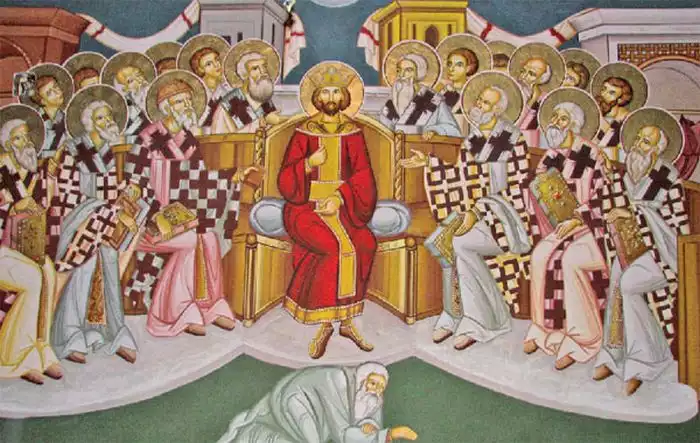
In the pivotal year of 314 AD, a significant ecclesiastical gathering, the Arles Synod, decisively branded Donatism as schismatic. This momentous event unfolded in the wake of the Diocletian Persecution, casting a profound shadow on the early Christian Church. Donatism, emerging from the fervent religious landscape of North Africa, challenged the fabric of ecclesiastical unity, propelling the Arles assembly to address this growing schism. The synod’s condemnation not only shaped the theological discourse of the time but also marked a defining chapter in the church’s endeavor to maintain doctrinal purity and unity amidst tumultuous times. The Arles Synod’s stance against Donatism stands as a testament to the early church’s resolve in confronting and resolving internal dissensions.
Donatism: Unravel the Synod’s Bold Stand
In the turbulent wake of the Diocletian Persecution, the Christian Church found itself at a pivotal crossroads, grappling with the profound ramifications of internal discord and the challenge of maintaining doctrinal purity. Central to this period of ecclesiastical strife was the emergence of Donatism, a movement rooted in the rich theological soil of North Africa. The Donatists staunchly advocated for the sanctity and purity of the clergy, contending that the sacraments administered by priests who had lapsed during persecution were invalid. This doctrine not only challenged the established ecclesiastical authority but also threatened the unity of the Christian community, as it questioned the spiritual efficacy of the church’s sacraments.
The controversy reached its zenith when the Arles Synod convened in 314 AD, a gathering that drew bishops from across the Roman Empire. This assembly was not merely a forum for theological debate but a crucial juncture in the church’s history, tasked with addressing the schismatic tendencies of the Donatist movement. The synod’s proceedings were marked by intense deliberations, as bishops from diverse regions brought forth their perspectives, weaving a complex tapestry of theological discourse. The Arles Synod’s primary objective was to reaffirm the cohesion of the Christian Church and to articulate a clear stance against the divisive doctrine of the Donatists.
At the heart of the synod’s deliberations was the principle of ecclesiastical unity, a cornerstone of the early church’s identity. The bishops contended that the sanctity of the clergy and the validity of the sacraments were not solely contingent upon the moral purity of individual priests but were instead anchored in the collective faith and unity of the church. This perspective underscored the belief that the church, as a whole, transcended the individual failings of its members, embodying a communal sanctity that was inviolable.
The Arles Synod’s condemnation of Donatism was not merely a theological pronouncement but a decisive action aimed at preserving the fabric of Christian unity. The synod’s decision reverberated through the corridors of ecclesiastical history, setting a precedent for the church’s approach to internal dissent and doctrinal purity. The bishops’ affirmation of the sanctity of the sacraments, irrespective of the moral stature of the clergy, underscored a fundamental tenet of Christian theology – the grace of God operates through the church as an institution, an entity larger than the sum of its parts.
The ramifications of the Arles Synod’s decision were far-reaching, echoing through the subsequent centuries of church history. The condemnation of Donatism served as a clarion call for the church to introspect and reaffirm its commitment to ecclesiastical unity and doctrinal integrity. The synod’s stance against the schismatic movement was not merely a rejection of a particular doctrinal viewpoint but a robust affirmation of the church’s collective identity and its enduring mission in a world fraught with spiritual and societal challenges.
As the echoes of the Arles Synod’s verdict faded, the Christian Church embarked on a path of introspection and renewal. The synod’s decision to uphold the sanctity of the sacraments and the unity of the church laid the groundwork for a deeper understanding of the ecclesiastical community’s role in mediating divine grace. This period of ecclesiastical history, marked by the synod’s decisive action against Donatism, paved the way for a renewed emphasis on the church’s collective responsibility in nurturing the spiritual life of its adherents, fostering a sense of communal belonging that transcended individual shortcomings.
The story of the Arles Synod and its condemnation of Donatism is a testament to the early church’s resilience and its unwavering commitment to preserving the core tenets of Christian faith. As the church navigated the tumultuous waters of doctrinal discord, the Arles Synod emerged as a beacon of unity and a symbol of the enduring strength of the ecclesiastical community. The legacy of this historic gathering continues to resonate, reminding us of the enduring power of collective faith and the unyielding resolve of the church to confront challenges with wisdom and unity.
In this unfolding narrative of ecclesiastical history, the Arles Synod stands as a pivotal chapter, a moment when the church asserted its authority and reaffirmed its foundational principles. As the story of the early Christian Church continues to be told, the lessons of the Arles Synod remain ever relevant, guiding the church’s journey through the ages and inspiring a continued commitment to unity, integrity, and the unwavering pursuit of spiritual truth. To be continued.
The Arles Synod of 314 AD marked a critical juncture in early Christian history, decisively confronting the schismatic nature of Donatism. This pivotal moment not only fortified the Church’s doctrinal foundation but also underscored its commitment to unity and integrity. As a beacon of ecclesiastical resilience, the Synod’s legacy endures, reminding us of the profound importance of maintaining doctrinal purity and communal harmony within the Christian faith.
References
Barnes, T. D. Constantine and Eusebius. Harvard University Press, 1981.
Frend, W. H. C. The Rise of Christianity. Fortress Press, 1984.
Maier, H. O. The Social Setting of the Ministry as Reflected in the Writings of Hermas, Clement, and Ignatius. Fortress Press, 1976.
Wilken, R. L. The Christians as the Romans Saw Them. Yale University Press, 1984.
